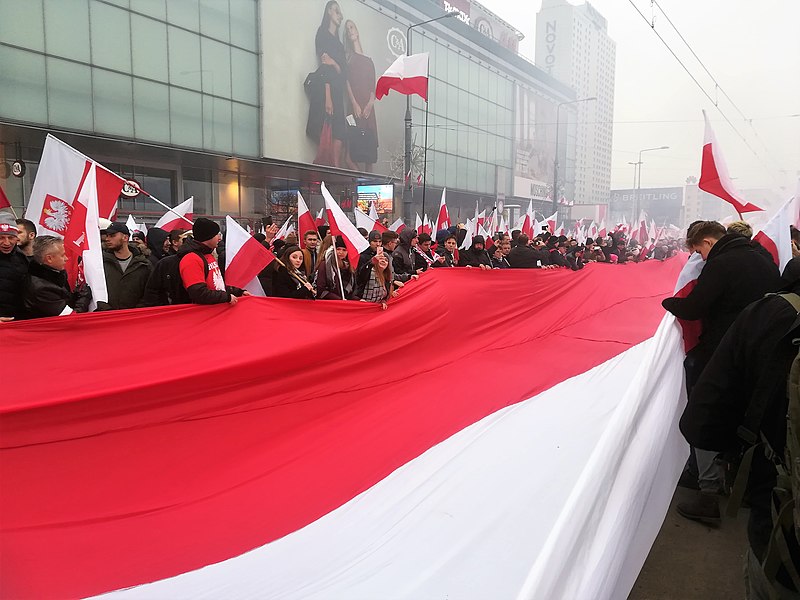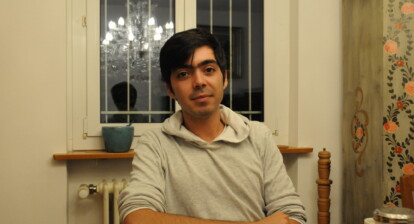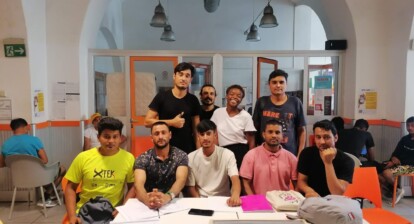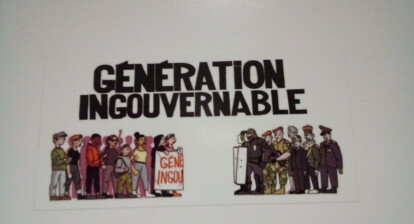For many, xenophobia in Poland primarly seems to be connected to its recent increase. By talking to Polish peers, our author Paweł experienced that the issue is much more complex than it appears at first glance. Looking at the current political situation in Poland, the thoughts and actions of both, the populist right wing and the conservative party seem to appeal to a big part of the Polish society. Where does this phenomenon come from and how does this affect young students from abroad in their everyday lives?
Hate in Today’s Poland
It happened on Polands independence day, 11th November. We usually celebrate this with a big march through our cities. In my city, Gdańsk, we also have one, but the biggest one takes place in Warsaw – our capital. In November 2018, the Polish Republic could look back on 100 years of existence. Of course, this needed to be celebrated. The amazing show with huge fireworks enlightening the streets of the capital was screened on TV.
So I prepared myself a coffee, sat down and watched it. One journalist was asking people:”Why did you come here?” The very first person he asked, an old man, answered: “In order to not let the Jews keep the power in Poland”. This answer was a shock. Whom did he mean? On a rational level, I just couldn’t understand what this guy was talking about. And if I was not able to, how could somebody being less familiar with Polish politics and prejudices understand this statement?
The man’s answer gives a brief idea of xenophobia and antisemitism in today’s Poland. Maybe this is caused by anxiety, hate or any kind of fear towards the new and unknown. In any case, it is something that can be dangerous. Especially nowadays, with the EU going through rough times initiated by the refugee crisis in 2015, by political conflicts of its members, economic differences between the countries and fueled by terrorist attacks. After all, this leads to a feeling of insecurity among many European citizens. My home country Poland is a good example for such concerns.
Why Prawo i Sprawiedliwość (PiS) is so Successful
Looking at foreign media, it is obvious that people from many European countries are worried about the political changes in Poland. I consider the Polish society as rather conservative, so it is little surprising that people elected Prawo i Sprawiedliwość (PiS) in 2015. In Europe, PiS might be compared to the German “Alternative für Deutschland” (AfD) or French Rassemblement National (RN), the former Front National, parties with radical right-wing ideas. Since Hungary is one of the closest allies of Poland these days, comparisons are also made to the Hungarian Fidesz.
It is true that PiS presents conservative, nationalistic views, but, in comparison to the AfD, it has been part of Polish politics for many years, even as a ruling party (2005-2007) when Jarosław Aleksander Kaczyński – the current leader of PiS – was prime minister. Another key figure of PiS’ early success was Jarosławs brother Lech, president of Poland from 2005 until his death in 2010. In my opinion, voting for PiS is not a sign of rising xenophobia. The main reason is that Platforma Obywatelska (PO), the predecessor of PiS in government, was ruling for eight years and people simply lost trust in PO. In the 2015 elections, PiS had a social programme focused on the poorest and lower middle class. In addition, their candidates for the PM and the president were fresh faces in Polish politics – a strong contrast to the candidates of the PO.
The Right Blames Immigrants as Terrorists
However, PiS and their voters are strictly conservative when it comes to topics like abortion or same-sex marriages, a breeding ground for discrimination against women or LGBTs. Especially since the major party has about 50% of seats in the parliament, it is hard to make any progress against their will. Moreover, the increasing number of refugees in Europe since 2015 triggered fear and distrust towards our European neighbours. Even though Poland has not even let in Muslim refugees – and will not do so in the future.
Because of the assaults carried out by Islamic extremists in Germany or France and other European countries, many Polish people are nevertheless afraid of terrorist attacks. Most of those terrorists were living in Europe before 2015 and cannot be objectively connected to the actual refugee issue. But state controlled and conservative media in Poland as well as politicians have been linking those attacks to or even blamed refugees while praising themselves for not allowing any of them to enter Poland. People adopt this view and generally distrust Muslim refugees because of stories that DAESH terrorist, disguised as refugees, came into the EU.
The far right: In Parliament and on the Street
More radical people have less tolerant views about all foreigners in Poland. Although they came here to work, study or just because they love Polish culture and the country. Notwithstanding that there is no right wing extremist party in the parliament (due to the really low support in the society), there are some MP’s who have clear far-right views coming from parties like Kukiz 15’. It was gaining members from many different groups like people who wish to make the economy more liberal or want to change the electoral system. Among those are also nationalists like members of Ruch Narodowy (National Movement). This party did not gain much support in the last elections. So for them, the only way to enter the parliament was to create an alliance with Kukiz 15’. In the upcoming elections they are thus going to stand together with Janusz Korwin Mikke who holds extremely liberal views and Grzegorz Braun, who is known for conservative and nationalistic views.
The Independence March
Even if the far right is barely in the parliament, its presence outside of it is unmissable. The most visible sign is probably the independence march, which I described right in the beginning. Every year, this event attracts millions of people, being a combination of extreme patriotism and nationalism. All parts of society participate in the march, ranging from little children to veterans of the Second World War. But there is another big group, too: far-right participants. They use the celebrations being held all over the country, as a stage for political manifests. One can see them carrying banners with sometimes even racist slogans, shouting their slogans and behaving aggressively. Even if those far right participants do not have much support, they are clearly visible at such events. Unfortunately, it makes also the march of independence a demonstrating their power and radical views containing a clear anti-immigrant rethoric.
Real Challenges by Ukrainian Migration?

Some branches have already adjusted to Ukrainians as a new target group: Polish SIM card for Ukrainian consumers without Polish language skills [Photo: author].
Connected to this are the more or less two million Ukrainians in Poland. The Polish government is very open to Ukrainian immigrants, because they are helping to increase economic growth. A similar culture and language as well as the war in Eastern Ukraine are definetely push- and pull-factors which make Ukrainians moving westwards. Of course, Ukrainians are not the only migrants in Poland. Many people come from Belarus or Russia, but also from Asian countries like Vietnam or Pakistan.
I work together with several people from these countries. But according to data of the Polish Migration Office, more than half of all permits to stay in Poland are given to the citizens of Ukraine. Right now, many banks or mobile companies offer Ukrainian as a service language (next to English). Also, some commercials are written in Ukrainian or Russian and even movies in Ukrainian are screened in the cinemas.
My brother’s girlfriend, Marharyta, comes from Ukraine and works in a company which helps immigrants from Ukraine or Russia to find a job. She says that she does not experience any worse treatment in general. Since she speaks Polish fluently without accent, I believe that people do not even recognize her as a foreigner. It also turns into good because people are appreciating that people from other countries can speak their language. Marharyta highlights the fact that some Ukrainians do not learn the Polish language at all and thus isolate themselves from the rest of the society. She says that these people have a lot of problems with finding a well-paid job.
Marc and Katja: A Students’ View

Marc (25) from Dortmund (Germany) [Photo: Private].
In my workplace and at university, there are also people from abroad. I asked some of them about their experiences in Poland. Marc (25), who does his master in biotechnology at the University of Gdańsk, says “In general I feel good in Poland. Most people are nice, and I have been in situations, in which people had problems with the fact that I am German only two times. One time I was playing in the local football team here in Gdańsk. Unfortunately, I had to hear a lot of comments like ,Fuck Germans’ etc. The other time, one guy came to me and complained that I should be speaking Polish when I am in Poland.”

Katja (28) from Witebsk (Belarus) [Photo: Private].
Katja is an economy student: “I am working in an international company where most of the co-workers have already lived abroad and experienced to be foreigners themselves. So, they are more open and stereotype-free in my opinion. But I heard from my friends that their colleagues are saying bad things, mostly about Ukrainians. For example that they would steal jobs from Polish workers and behave like they would be in their home country. Some of my friends, who are homosexual, say that they also feel a bit alienated since Poland is a very conservative and religious country.
In general, I do not feel alienated due to my Belarusian passport. But sometimes people are trying to take advantage of the fact that I am a foreigner. For example, in stores when I want my money back or in public offices. I also heard comments that just because I am a foreigner, I cannot deal with an automatic cash desk.”
Actions of Individuals are Crucial for the Fight Against Xenophobia
I personally neither experienced any xenophobically actions in my job, nor at the university. My colleagues and friends do not seem very concerned about the everyday phenomenon of xenophobia. However, it is impossible to say that it does not exist. In my opinion, many fears are being spread by media, which is often focusing on sensation. It does not mean that we as individuals can only blame the media. Talking to each other and educating ourselves will help us to create a life without xenophobia. Unfortunately, It is impossible to end it once and for all. Nevertheless, I firmly believe that even small actions of smart individuals can make a big difference.





